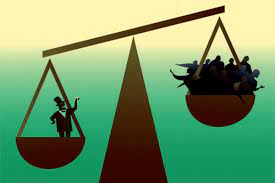The United Nations Research Institute for Social Development (UNRISD), in its new report, calls for a new eco-social contract to build a more equal future.
By Abdourahmane Diallo
Courani Diarra, editor of a pan-African sports news website, never imagined she would lose her job because she was sick with Covid-19.
“During my first month of Covid-19, I was in bad shape. I was on oxygen for two weeks, but that didn’t stop me from caring about work. Throughout my recovery, I tried to work, give directions… Plus, I wasn’t paid because I was… sick,” she recalls.
In spite of her self-sacrifice and desire to carry this website that had just been launched, “I lost my job when I least expected it. Psychologically, I had already found it a bit inelegant not to be paid because I was sick, even though I was one of the people who had protected themselves the most. Beyond the inelegance, I found that it is unfair”, she explains.
While Courani did not suffer economically from the dismissal, the people who benefited from her assistance during this exceptional period felt that their benefactor’s status had changed.
Like Courani Diarra, Aicha Dia did not receive a notice of termination from the agribusiness company where she had been working.
“When I lost my job, I went weeks without telling my family. Every day I got up and went to look for work. I owed money to my school because I was paying for my education and my little sister’s education. I had to finish my last year, but unfortunately I couldn’t do my defense. I used up all my savings but it wasn’t enough,” she explains bitterly.
Even today, she is still looking for a stable job to support herself.
Courani Diarra and Aicha Dia are certainly among the 120 million or so people affected by extreme poverty as a result of Covid-19 and identified by the United Nations Research Institute for Social Development’s Inequality Report.
While it is true that the pandemic has widened the gaps between the poor and the rich, the report shows that this situation is the result of a system in which inequality and injustice are built in by design.
The paper thus links the multiple crises and growing inequalities we face to the policy choices promoted in the era of neoliberal hyperglobalization.
“The damage caused by Covid-19, HIV and other pandemics is not just the result of viruses on human health, but has also widened the cracks in our unequal society,” the report says, quoting UNRISD Executive Director, Winnie Byanyima.
The report presents a fractured world facing severe crises, growing inequalities and public health problems. However, these problems are not a flaw in the system, but a characteristic of it, explains the UN agency, pointing out that inequality amplifies these various failures.
To reverse this trend, UNRISD researchers propose the creation of a new eco-social contract and a policy approach based on alternative economies, transformative social policies, reimagined multilateralism and strengthened solidarities.
This approach would address inequalities, break the cycle of multiple and intertwined crises and work towards a more egalitarian, just and sustainable future.
ARD/te/fss/as/APA


